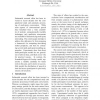Free Online Productivity Tools
i2Speak
i2Symbol
i2OCR
iTex2Img
iWeb2Print
iWeb2Shot
i2Type
iPdf2Split
iPdf2Merge
i2Bopomofo
i2Arabic
i2Style
i2Image
i2PDF
iLatex2Rtf
Sci2ools
ACL
2010
2010
Modeling Norms of Turn-Taking in Multi-Party Conversation
Substantial research effort has been invested in recent decades into the computational study and automatic processing of multi-party conversation. While most aspects of conversational speech have benefited from a wide availability of analytic, computationally tractable techniques, only qualitative assessments are available for characterizing multi-party turn-taking. The current paper attempts to address this deficiency by first proposing a framework for computing turn-taking model perplexity, and then by evaluating several multi-participant modeling approaches. Experiments show that direct multi-participant models do not generalize to held out data, and likely never will, for practical reasons. In contrast, the Extended-Degree-of-Overlap model represents a suitable candidate for future work in this area, and is shown to successfully predict the distribution of speech in time and across participants in previously unseen conversations.
ACL 2010 | Computational Linguistics | Direct Multi-participant Models | Multi-party Conversation | Substantial Research Effort |
| Added | 10 Feb 2011 |
| Updated | 10 Feb 2011 |
| Type | Journal |
| Year | 2010 |
| Where | ACL |
| Authors | Kornel Laskowski |
Comments (0)

